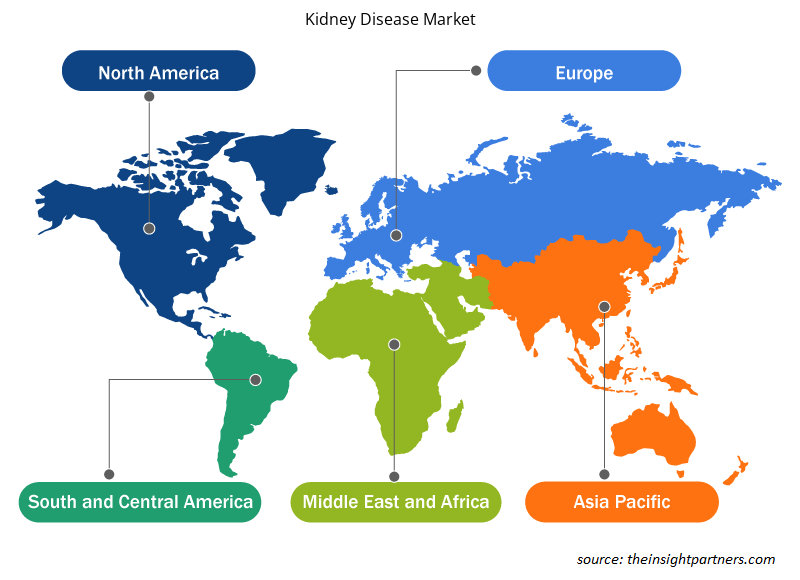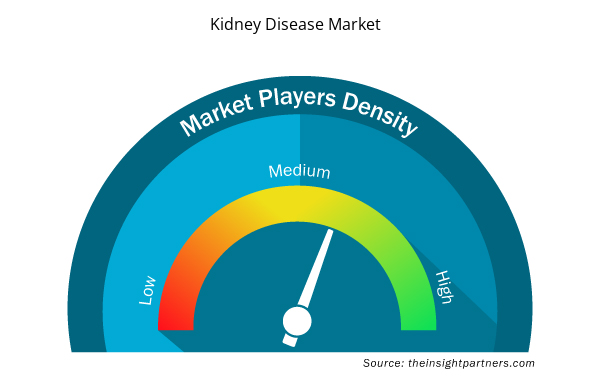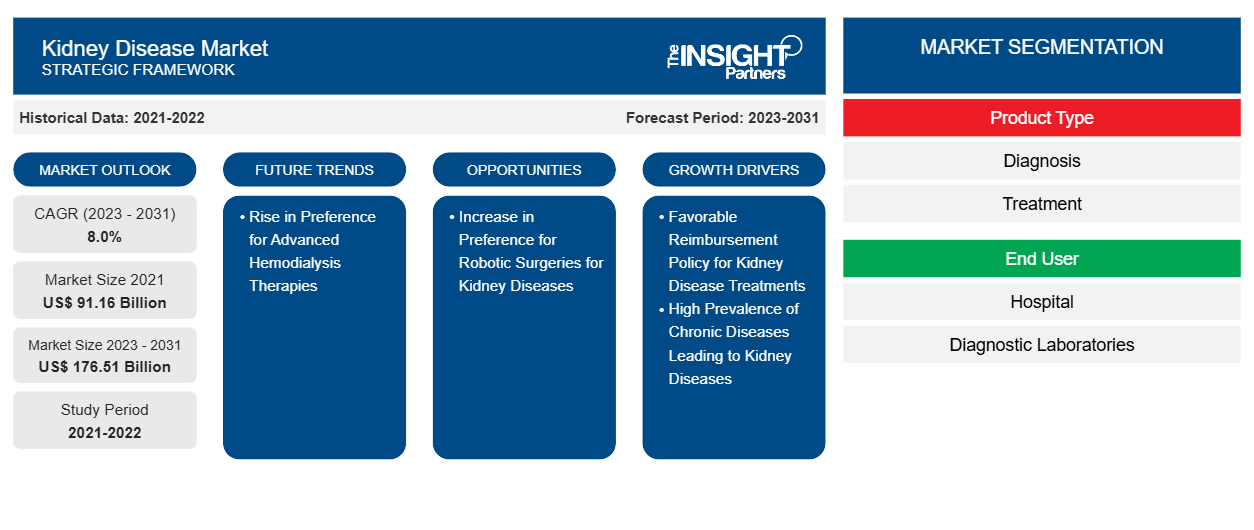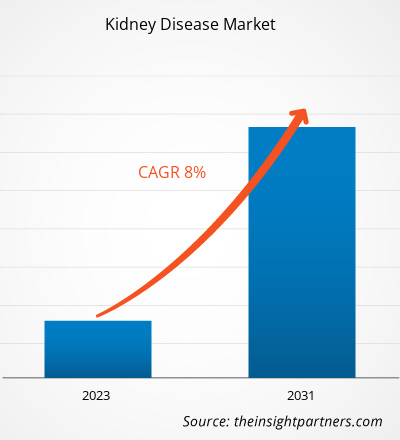肾病市场规模预计在 2021 年为 911.6 亿美元,在 2023 年为 XX 亿美元,预计到 2031 年将达到 1765.1 亿美元;预计 2023-2031 年的复合年增长率为 8.0%。
肾脏疾病的发病率不断上升,越来越多的老年患者愿意留在家中接受治疗,这推动了以消费者为导向、注重安全性的新兴产品的出现。此类先进的治疗替代方案很可能仍是肾脏疾病市场的主要趋势。
肾脏疾病市场分析
慢性肾病 (CKD) 是一种常见且危及生命的疾病,影响全球十分之一的人。高血压和糖尿病占所有 CKD 病例的三分之二。此外,根据国家肾脏基金会在 2020 年发布的研究,大约 35% 的 20 岁以上糖尿病患者会在此期间患上慢性肾病。此外,世界卫生组织概述了维持政策制定者政策的各种策略,包括重要药物清单概念和全民健康覆盖 (UHC) 方法。此外,随着生活成本的增加,报销家庭透析治疗的公用事业费用至关重要。欧洲国家已经制定了报销制度,旨在免费或以较低的价格提供各种重要药物。例如,2024 年 2 月,在英国肾脏护理组织发起的宣传活动之后,苏格兰政府推出了首个针对苏格兰家庭透析人员报销的国家指南。此外,在威尔士,所有形式的家庭透析都可以报销。预计这些因素将在预测期内推动市场增长。
肾脏疾病市场概况
患有 CKD 的人,肾脏受损,无法过滤血液,导致体内血液中过多的液体和废物,从而导致其他健康问题,例如心脏病和中风。美国疾病控制和预防中心 (CDC) 表示,超过七分之一的美国成年人(约 3550 万人或 14%)患有 CKD。十分之九的成年人不知道自己患有 CKD,三分之一患有严重 CKD 的成年人不知道自己患有 CKD。市场的另一个主要驱动力是老年人口的增加,因为老龄化是肾脏疾病发病率上升的风险因素。例如,根据人口参考局 (PRB) 在 2024 年发布的一项研究,到 2050 年,65 岁以上的美国人预计将从 2022 年的 5800 万增加到 8200 万,增长 47%,占总人口的比例将从 17% 增加到 23%。美国政府的持续支持将为该国提供丰厚的机会。例如,2024 年 2 月,Simple HealthKit 推出了一项新的肾脏护理计划来支持健康计划,该计划提供早期检测,帮助患者获得更好的结果并大幅降低护理成本。Simple HealthKit 与商业和政府健康计划合作提供现有产品,并与他们合作设计定制测试程序,这些程序可以部署以联系难以联系的成员。
定制此报告以满足您的需求
您可以免费定制任何报告,包括本报告的部分内容、国家级分析、Excel 数据包,以及为初创企业和大学提供优惠和折扣
- 获取此报告的关键市场趋势。这个免费样品将包括数据分析,从市场趋势到估计和预测。
肾脏疾病市场驱动因素和机遇
慢性病患病率高致肾病市场受青睐
慢性肾病会损害肾功能并导致肾脏损伤。导致慢性肾病的疾病和病症包括糖尿病和高血压。根据美国国家医学图书馆 (NLM) 发布的报告,全球约 80% 的糖尿病负担来自中低收入国家,而 60% 的病例发生在亚洲,即糖尿病患病率最高的 10 个国家中有 6 个在亚洲。根据世界经济论坛的数据,中国是世界上糖尿病发病率最高的国家之一,并且还在继续恶化。在中国,2021 年,全国估计有 1.41 亿糖尿病患者,预计 2020-2030 年期间 20-79 岁成年人的糖尿病患病率将从 8.2% 上升到 9.7%。
肾脏疾病机器人手术的青睐度增加——一个机会
根据美国国家肾脏基金会的数据,肾脏疾病导致肾癌的风险更高,并且是慢性肾脏疾病 (CKD) 患者死亡的第二大原因。为了精确切除肿瘤,机器人部分肾切除术可用于保持肾脏健康和功能完好。此外,FAST 机器人部分肾切除术是一种增强方法,可通过手术切除肾脏肿瘤并重建肾脏以防止功能损伤。北美、欧洲和亚洲各国在手术中采用机器人的人数显著增加。
肾脏疾病市场报告细分分析
有助于肾脏疾病市场分析的关键部分是产品类型和最终用户。
- 根据产品类型,肾脏疾病市场分为诊断和治疗。诊断部分细分为血液检查、尿液检查、影像检查等。治疗部分进一步细分为药物类别、透析等。诊断部分在 2023 年占据了更大的市场份额。
- 根据最终用户,市场分为诊断实验室、医院和其他。医院部门在 2023 年占据了最大的市场份额。
肾脏疾病市场份额按地区分析
肾脏疾病市场报告的地理范围主要分为五个地区:北美、亚太、欧洲、中东和非洲、南美/南美和中美。
北美占据了肾病市场的主导地位。在美国,约有 15% 的成年人患有慢性肾病。美国约有 3700 万人患有慢性肾病。2022 年,北美占据了最大的份额。由于该地区 CKD 发病率的上升以及全球市场参与者的存在,是导致北美肾病市场占据主导地位的因素。预计亚太地区将在未来几年以最高的复合年增长率增长。
肾脏疾病市场新闻和最新发展
肾脏疾病市场通过收集一级和二级研究后的定性和定量数据进行评估,其中包括重要的公司出版物、协会数据和数据库。以下是肾脏疾病市场的发展列表:
- 勃林格殷格翰和礼来公司宣布,美国食品药品监督管理局 (FDA) 批准 Jardiance(恩格列净)10 毫克片剂,用于降低有进展风险的慢性肾病 (CKD) 成人患者的估计肾小球滤过率 (eGFR) 持续下降、终末期肾病、心血管死亡和住院风险。(来源:勃林格殷格翰和礼来公司/公司网站,2023 年 9 月)
- 美国食品药品管理局批准 Farxiga(达格列净)口服片剂,用于降低患有慢性肾病且有病情进展风险的成年人的肾功能衰退、肾衰竭、心血管死亡和心力衰竭住院风险。(来源:美国食品药品管理局,新闻稿,2021 年 4 月)
肾脏疾病市场区域洞察
Insight Partners 的分析师已详细解释了预测期内影响肾脏疾病市场的区域趋势和因素。本节还讨论了北美洲、欧洲、亚太地区、中东和非洲以及南美洲和中美洲的肾脏疾病市场细分和地理位置。

- 获取肾脏疾病市场的区域特定数据
肾脏疾病市场报告范围
| 报告属性 | 细节 |
|---|---|
| 2021 年市场规模 | 911.6亿美元 |
| 2031 年市场规模 | 1765.1亿美元 |
| 全球复合年增长率(2023 - 2031) | 8.0% |
| 史料 | 2021-2022 |
| 预测期 | 2023-2031 |
| 涵盖的领域 | 按产品类型
|
| 覆盖地区和国家 | 北美
|
| 市场领导者和主要公司简介 |
|
肾脏疾病市场参与者密度:了解其对业务动态的影响
肾脏疾病市场正在快速增长,这得益于终端用户需求的不断增长,而这些需求又源于消费者偏好的不断变化、技术进步以及对产品优势的认识不断提高等因素。随着需求的增加,企业正在扩大其产品范围,进行创新以满足消费者的需求,并利用新兴趋势,从而进一步推动市场增长。
市场参与者密度是指在特定市场或行业内运营的企业或公司的分布情况。它表明在给定市场空间中,相对于其规模或总市场价值,有多少竞争对手(市场参与者)存在。
在肾脏疾病市场运营的主要公司有:
- 雅培实验室
- 安进公司
- F. 霍夫曼-罗氏有限公司
- 葛兰素史克公司
- 辉瑞公司
- 西门子医疗
免责声明:上面列出的公司没有按照任何特定顺序排列。

- 了解肾脏疾病市场顶级关键参与者概况
肾脏疾病市场报告覆盖范围和交付成果
“肾脏疾病市场规模和预测(2022-2030 年)”报告对以下领域进行了详细的市场分析:
- 范围内所有主要细分市场的全球、区域和国家层面的市场规模和预测
- 市场动态,如驱动因素、限制因素和关键机遇
- 未来主要趋势
- 详细的 PEST/波特五力分析和 SWOT 分析
- 全球和区域市场分析涵盖关键市场趋势、主要参与者、法规和最新市场发展
- 行业格局和竞争分析,涵盖市场集中度、热点图分析、知名参与者和最新发展
- 详细的公司简介
- 历史分析(2 年)、基准年、预测(7 年)及复合年增长率
- PEST 和 SWOT 分析
- 市场规模价值/数量 - 全球、区域、国家
- 行业和竞争格局
- Excel 数据集



Report Coverage
Revenue forecast, Company Analysis, Industry landscape, Growth factors, and Trends

Segment Covered
This text is related
to segments covered.

Regional Scope
North America, Europe, Asia Pacific, Middle East & Africa, South & Central America

Country Scope
This text is related
to country scope.
Trends and growth analysis reports related to Life Sciences : READ MORE..
- Abbott Laboratories
- Amgen Inc.
- AstraZeneca PLC
- Beckman Coulter
- F. Hoffmann-La Roche Ltd
- GlaxoSmithKline PLC
- Pfizer Inc.
- Siemens Healthineers
- Sysmex Corporation
- Teva Pharmaceutical Industries Ltd.
The Insight Partners performs research in 4 major stages: Data Collection & Secondary Research, Primary Research, Data Analysis and Data Triangulation & Final Review.
- Data Collection and Secondary Research:
As a market research and consulting firm operating from a decade, we have published and advised several client across the globe. First step for any study will start with an assessment of currently available data and insights from existing reports. Further, historical and current market information is collected from Investor Presentations, Annual Reports, SEC Filings, etc., and other information related to company’s performance and market positioning are gathered from Paid Databases (Factiva, Hoovers, and Reuters) and various other publications available in public domain.
Several associations trade associates, technical forums, institutes, societies and organization are accessed to gain technical as well as market related insights through their publications such as research papers, blogs and press releases related to the studies are referred to get cues about the market. Further, white papers, journals, magazines, and other news articles published in last 3 years are scrutinized and analyzed to understand the current market trends.
- Primary Research:
The primarily interview analysis comprise of data obtained from industry participants interview and answers to survey questions gathered by in-house primary team.
For primary research, interviews are conducted with industry experts/CEOs/Marketing Managers/VPs/Subject Matter Experts from both demand and supply side to get a 360-degree view of the market. The primary team conducts several interviews based on the complexity of the markets to understand the various market trends and dynamics which makes research more credible and precise.
A typical research interview fulfils the following functions:
- Provides first-hand information on the market size, market trends, growth trends, competitive landscape, and outlook
- Validates and strengthens in-house secondary research findings
- Develops the analysis team’s expertise and market understanding
Primary research involves email interactions and telephone interviews for each market, category, segment, and sub-segment across geographies. The participants who typically take part in such a process include, but are not limited to:
- Industry participants: VPs, business development managers, market intelligence managers and national sales managers
- Outside experts: Valuation experts, research analysts and key opinion leaders specializing in the electronics and semiconductor industry.
Below is the breakup of our primary respondents by company, designation, and region:

Once we receive the confirmation from primary research sources or primary respondents, we finalize the base year market estimation and forecast the data as per the macroeconomic and microeconomic factors assessed during data collection.
- Data Analysis:
Once data is validated through both secondary as well as primary respondents, we finalize the market estimations by hypothesis formulation and factor analysis at regional and country level.
- Macro-Economic Factor Analysis:
We analyse macroeconomic indicators such the gross domestic product (GDP), increase in the demand for goods and services across industries, technological advancement, regional economic growth, governmental policies, the influence of COVID-19, PEST analysis, and other aspects. This analysis aids in setting benchmarks for various nations/regions and approximating market splits. Additionally, the general trend of the aforementioned components aid in determining the market's development possibilities.
- Country Level Data:
Various factors that are especially aligned to the country are taken into account to determine the market size for a certain area and country, including the presence of vendors, such as headquarters and offices, the country's GDP, demand patterns, and industry growth. To comprehend the market dynamics for the nation, a number of growth variables, inhibitors, application areas, and current market trends are researched. The aforementioned elements aid in determining the country's overall market's growth potential.
- Company Profile:
The “Table of Contents” is formulated by listing and analyzing more than 25 - 30 companies operating in the market ecosystem across geographies. However, we profile only 10 companies as a standard practice in our syndicate reports. These 10 companies comprise leading, emerging, and regional players. Nonetheless, our analysis is not restricted to the 10 listed companies, we also analyze other companies present in the market to develop a holistic view and understand the prevailing trends. The “Company Profiles” section in the report covers key facts, business description, products & services, financial information, SWOT analysis, and key developments. The financial information presented is extracted from the annual reports and official documents of the publicly listed companies. Upon collecting the information for the sections of respective companies, we verify them via various primary sources and then compile the data in respective company profiles. The company level information helps us in deriving the base number as well as in forecasting the market size.
- Developing Base Number:
Aggregation of sales statistics (2020-2022) and macro-economic factor, and other secondary and primary research insights are utilized to arrive at base number and related market shares for 2022. The data gaps are identified in this step and relevant market data is analyzed, collected from paid primary interviews or databases. On finalizing the base year market size, forecasts are developed on the basis of macro-economic, industry and market growth factors and company level analysis.
- Data Triangulation and Final Review:
The market findings and base year market size calculations are validated from supply as well as demand side. Demand side validations are based on macro-economic factor analysis and benchmarks for respective regions and countries. In case of supply side validations, revenues of major companies are estimated (in case not available) based on industry benchmark, approximate number of employees, product portfolio, and primary interviews revenues are gathered. Further revenue from target product/service segment is assessed to avoid overshooting of market statistics. In case of heavy deviations between supply and demand side values, all thes steps are repeated to achieve synchronization.
We follow an iterative model, wherein we share our research findings with Subject Matter Experts (SME’s) and Key Opinion Leaders (KOLs) until consensus view of the market is not formulated – this model negates any drastic deviation in the opinions of experts. Only validated and universally acceptable research findings are quoted in our reports.
We have important check points that we use to validate our research findings – which we call – data triangulation, where we validate the information, we generate from secondary sources with primary interviews and then we re-validate with our internal data bases and Subject matter experts. This comprehensive model enables us to deliver high quality, reliable data in shortest possible time.


 获取此报告的免费样本
获取此报告的免费样本